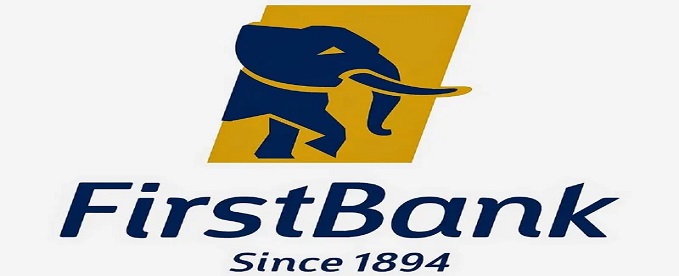E-Financial
First Bank Employee on the Run after Allegedly Diverting N40Bn

First Bank of Nigeria has initiated legal proceedings to recover substantial sums of money allegedly embezzled by an employee.

The bank, which boasts a market capitalization of ₦829 billion, reported the incident to the Nigerian Police Force on March 25, 2024, and subsequently obtained multiple court orders to freeze accounts linked to the stolen funds.
The employee—who is currently at large—is accused of transferring those monies to 98 bank accounts—including his wife’s—that were identified as first beneficiaries.
The bank received three court orders between April 4–8, 2024, to block hundreds of bank accounts that were allegedly receiving the stolen funds after reporting the incident to the Nigerian Police Force on March 25, 2024.
While the initial amount found to be diverted was approximately ₦12 billion, three people with direct knowledge of the incident told TechCabal that it currently stands at approximately ₦40 billion ($29 million).
According to a First Bank employee with knowledge of the situation, the employee, named in court documents as Tijani Muiz Adeyinka, was authorized to handle customer reversals in her capacity as a manager on the electronic products team. It implied that he was in charge of an account from which he could credit merchant accounts and process those reversals.
Instead, Muiz allegedly used that power to credit customer requests for reversals to a merchant under his control. He purportedly did not require any additional authorizations because he was the team’s final line of authorization, which allowed him to continue misappropriating client funds for nearly two years without being discovered.
His plot was eventually uncovered when a client filed a complaint, which was then forwarded to the internal control department of the bank. After identifying multiple questionable transactions, the control unit informed the authorities.
“We hereby bring to your notice the discovery of fraudulent transactions into various transactions within and outside the bank and request your good offices to set up the machinery of investigation in place with a view to unravel the circumstances surrounding the said fraud and get the culprits apprehending to face the wrath of the law,” read a letter dated May 10, 2024, from First bank to the Lagos State Commissioner of Police.
First Bank ignored TechCabal’s repeated calls and emails asking for comments.
An inquiry for comments was not immediately answered by a Nigerian Police Force spokesperson. An inquiry for comments was not answered by the Economic Financial Crimes Commission (EFCC) spokesperson.
“I discovered that one Muiz Tijani Adeyinka, a former staff of First Bank was involved in the nefarious posting of fraudulent transactions,” read a statement from the investigating Police officer in charge of the case signed March 26, 2024.
“It was discovered that he made some fraudulent transactions to his wife’s account number (name withheld) domiciled with Zenith Bank, which in turn transferred to other beneficiaries totaling thirty-four accounts which also gave birth to second beneficiaries domiciled with other banks totaling 1,190 accounts,” the statement added.
First Bank did not disclose the amount of money that was stolen in any of the numerous court filings or complaints.
Along with requesting that the Police “unravel the circumstances surrounding the fraud,” it remained silent on how the money was acquired.
Fraud is still a major problem in Nigeria’s financial services sector, even though there was a decrease in cases reported in Q1 2024.
The largest banks in the nation are frequently the target of fraud attacks, despite fintech startups receiving disproportionate attention.
E-Financial
Sofri Microfinance Bank Rejig Digital Platforms for Better Customer Experience

Sofri microfinance bank plans a massive rollout of Point of Sale, PoS terminals for merchants and agency banking in the third quarter of this year.

This is coming against the backdrop of the banks revamp of its digital platforms to support better customer experience.
Paul Adebayo, managing director, Sofri Microfinance Bank, said the bank is technology and purpose-driven, with focus on financial inclusion and sustainability. As well with the determination of making banking simpler, inclusive, and impactful.
He said that the revamped mobile app features, faster onboarding, cleaner interface, real-time alerts, enhanced security and seamless loan applications.
“Our corporate internet banking Launched for SMEs and institutional clients features, secure payments, transfers, account management and enhances business banking experience.
“Laying the groundwork for greater reliability, product innovation and operational efficiency is our new core banking infrastructure. This change enables us to scale faster and serve customers better.
“Our Terminal Management System (TMS) improves the performance, uptime, and remote monitoring of our POS terminals. This ensures merchants and field agents enjoy better stability, quicker settlements, and stronger support,” he added.
On sustainability impact, Adebayo, added that Sofri Microfinance bank is embedding ESG principles into its lending and operational models — from offering green financing options, to supporting waste-to-wealth entrepreneurs, and making inclusive finance part of Nigeria’s circular economy.
Sofri is a trademark of Links Microfinance Limited (Links Mfb). Links Mfb is licensed and regulated by Central Bank of Nigeria (CBN) and deposits insured by the Nigeria Deposit Insurance Corporation (NDIC). Links Mfb is a member of DLM Capital Group, owners of DLM Asset Management as regulated by the Securities and Exchange Commission (SEC).
E-Financial
DLM Group Unveils Innovative Sovereign Bond Backed Composite Notes

Current market research has confirmed that buyside investors are increasingly focused on high-growth sectors such as small businesses and consumer lending— sectors that fuel both the demand and supply sides of the economy.

However, capital allocation to these areas requires robust risk mitigation frameworks to preserve principal and ensure returns that are not just economically viable but outpace inflation.
Against the backdrop that DLM Capital Group has developed an innovative solution – the Sovereign Bond Backed Composite Notes (SBCNs) to meet this critical economy needs.
According to Sonnie Babatunde Ayere, the Group CEO of DLM Capital Group, “We believe that the consistent issuance of SBCNs by qualified entities will play a key role in de-risking corporate bond portfolios.
“By blending sovereign-backed security with enhanced yield exposure, portfolio managers gain a rare opportunity to simultaneously increase portfolio safety and performance”.
The first of its kind fixed income product combines the security of direct sovereign bond-backed principal protection, such as FGN Bonds, with the enhanced yield potential of corporate and consumer lending cash flows. This hybrid structure, the first of its kind in the local market, merges public-sector credit safety with private-sector income generation.
The instrument is designed as such that the private sector credit tranche will be secured by the FGN-bonds, which will be the senior tranche.
The N30 billion Sovereign Bond Backed Composite Notes issued by DLM Funding SPV Plc is being packaged as a AAA-rated note. With a held-to-maturity yield of 49.9 percent, the notes are designed to be attractive to institutional investors seeking a balance between capital preservation and superior returns.
Sonnie Babatunde Ayere, noted about the SBCN, “For asset managers, it enhances portfolio quality, improves credit profiles, supports diversification, and delivers competitive returns.
In a media parley describing the instrument, Ayere highlighted the role of the instrument in driving credit expansion to the underserved private sector. He highlighted how the note could help drive institutional capital into sectors that were previously considered too risky.
“By channeling domestic capital into these critical but underserved sectors without exposing investors to excessive risk, it becomes possible to mobilize funding for parts of the economy that have long been neglected.” He added.
E-Financial
Fidelity MD,Onyeali-Ikpe Champions Lifelong Learning and Sisterhood for Women’s Career Growth

Dr. Nneka Onyeali-Ikpe, Managing Director and Chief Executive Officer of Fidelity Bank Plc, has encouraged women professionals to embrace continuous learning, courage, and collaboration as key habits for achieving long-term career success and breaking through professional barriers.

Managing Director and Chief Executive Officer of Fidelity Bank Plc, Dr. Nneka Onyeali-Ikpe, OON, (Middle) flanked by participants of a Women’s Roundtable themed, “Mentorship with Dr. Nneka Onyeali-Ikpe” hosted by the bank over the weekend at the Fidelity SME Hub, Gbagada, Lagos recently.
She gave the charge during a Women’s Roundtable hosted by the bank over the weekend at the Fidelity SME Hub in Gbagada, Lagos. Themed “Mentorship with Dr. Nneka Onyeali-Ikpe”, the event drew female professionals from various sectors and was held under the Recognition and Networking arm of the bank’s HerFidelity Proposition—a flagship initiative designed to empower women entrepreneurs and professionals across Nigeria.
Explaining the vision behind HerFidelity, Dr. Onyeali-Ikpe noted that the initiative was born out of a strong need to provide women with holistic support beyond access to finance.
“In my engagements with women across different industries, I’ve seen first-hand that while talent and ambition abound, many still lack access to capital, skills development, health support, and networks,” she said.
“HerFidelity was created to bridge that gap by focusing on four key pillars: access to capital, capacity building, wellness for work-life balance, and entrepreneurship support. It’s one of the initiatives I’m most proud of, because when women thrive, communities prosper and economies flourish.”
The interactive mentorship session, held in a Q&A format, offered participants an opportunity to learn directly from the trailblazing CEO, who shared personal experiences and career insights.
Advising young women aspiring to leadership, she said: “Believe in yourself, be ready to work hard, and never shy away from taking smart risks. Seek out mentors, invest in meaningful relationships, and above all, collaborate—because no one truly succeeds alone.”
The event also featured fun competitions and giveaways, with attendees winning exciting gifts courtesy of Fidelity Bank.
Dr. Onyeali-Ikpe’s session left participants inspired, reinforcing Fidelity Bank’s position as a champion for gender empowerment and a leading supporter of women’s advancement in business and leadership.

 General News2 days ago
General News2 days agoNASRDA, Galaxy Space Firm Sign MoU on Satellite Connectivity

 Telecom2 days ago
Telecom2 days agoOver 1m Nigerians Reached through MTN Staff’s Digital and Community Outreach

 Telecom2 days ago
Telecom2 days agoMafab Gets 0724 Number Series, Launches Mcom 5G Brand

 News2 days ago
News2 days agoDBN Awards N13m in Grants to Tech Startups

 Telecom2 days ago
Telecom2 days agoNCC to Name, Shame Telecom Infrastructure Vandals

 News2 days ago
News2 days agoFCCPC Shuts France, Belgium, and Italy Visa Centres in Abuja Over Alleged Consumer Rights Violations

 Telecom2 days ago
Telecom2 days agoWSIS Review: Nigerian ICT Leaders Urged to Shape Global Digital Future

 E-Financial2 days ago
E-Financial2 days agoBank Customers Petition CBN over Illegal Deductions, Demand Action




























